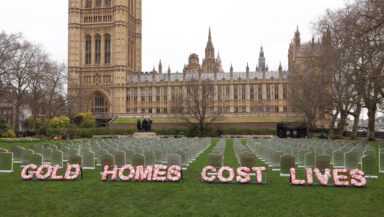It’s been 6 days since activists climbed on board a BP oil rig that plans to get 30 million barrels of oil from the Vorlich field in the North Sea.
So while we’re here waiting and hoping for a proper response from BP on the climate emergency. Here’s why we’re here and what we’re hoping to achieve.
Why BP and why this oil rig?
BP and the rest of the oil industry are fuelling a climate emergency.
The bottom line is we already have too much oil and gas in production or under development to keep global emissions to where we need it to be.
Have you heard of ‘1.5 degrees’ or ‘the Paris Climate Agreement’? The crux of it is that in order to stop our planet from figuratively becoming a “hell-fire wasteland” they need to stop the mining and burning of fossil fuels. Like yesterday.
This rig in particular is heading out to the North Sea with BP hoping to open up new production of around 30 million barrels of oil.
The company still aims to drill for everything it can find from here in the North Sea to the Arctic and the Amazon. And as we established, this will have tragic consequences for the climate and life on earth.
But I’ve heard the rig is actually owned by Transocean?
BP have hired the rig. BP don’t own any rigs, they hire people to do the work for them. And while we’re on the topic, Transocean isn’t exactly a ‘stand up company’ either. It was the company contracted by BP who were responsible for the Deepwater Horizon oil spill disaster in the Gulf of Mexico in 2010.
Hang on, Paris Agreement? 1.5?
These terms get thrown out a lot, and it’s ok if you don’t know what they are. Sometimes I think governments make it more complicated on purpose, just to throw us all off. Here’s my understanding of it:
The Paris Climate Agreement is a globally agreed treaty to combat climate change. Governments signed up to it have agreed to take action to reduce greenhouse gas emissions.
Put simply, these measures are to ensure the average global temperatures doesn’t increase past 1.5 degrees.
I know 1.5 might not feel like a lot when you think about it on an individual scale. But think about it this way, if everywhere on the planet turned up the heat by 1.5 delicate ecosystems that can’t deal with more heat (like coral reefs or Arctic regions) will suffer are already suffering the consequences. This is bad news for people and the planet.
What do you want BP to do?
We want BP to make their business better for the planet. That means making sure BP also gets in line with the Paris Climate Agreement.
That means either shifting to 100% renewable energy or starting a managed decline of their business.
It means an immediate stop to all oil exploration and development of new oil fields as well as all lobbying against climate progress.
Thank you, next.
BP are saying they’re committed to addressing the climate chaos and they are consistent with the Paris Agreement?
Gotta appreciate a bit of PR spin when you see it.
No, what they say is that they are going to explain how they are already “consistent” with a 1.5 degrees scenario by next year. But we know that to have a decent chance of keeping global temperatures at or close to 1.5 degrees we can’t even burn all the oil and gas in production and projects in development.
Yet BP are spending billions exploring for more oil and gas, which if burned will send global temperatures soaring with dire consequences for people and planet.
To be genuinely aligned with a 1.5 degree outcome, the company would have to immediately stop exploring for new oil and gas and rapidly make the transition to a 100% renewables company or wind the company down.
But don’t we need more oil?
No we don’t. What we need is a planet we can live on.
Most oil is used in transportation and with the right support we can make a rapid transition to electric vehicles or do away with cars and switch to more walking, cycling and public transport – especially in cities. For other needs there is already more than enough oil and gas.
Doesn’t Greenpeace use oil in its ships and vehicles?
It’s not like we’re expecting everyone to stop using oil immediately. We all have to rapidly move to other fuels and other means of transport. So where there’s no alternative we use some oil but we don’t want to and are demanding a rapid shift to the alternatives.
What about the jobs of people working in the oil industry?
Losing a job is never easy and it’s important that people are protected.
Around the world, governments and stakeholders are considering how to implement a “just transition” from fossil fuel to clean energy – a transition that’s fair for local workers and communities.
Clean and renewable industries are the future. Scotland’s oil communities have exactly the sort of skills we need to build that future and build it quickly.
It’s important to note that per unit of energy renewables create more jobs than in traditional fossil fuel industries so if BP switch to investing in renewables it would be a boon for their workforce and jobs in general.
What can I do?
You’ve come to the right place.
If you’ve got a few minutes: Call BP out publicly on their lies and hypocrisy. You can comment on BP’s social media posts and get them to tell the truth – they’re tipping us over the edge into climate breakdown.
We’re running out of time to solve this. And if we don’t, we risk more devastating floods, deadly fires and irreversible climate change – BP need to act fast, and we need to make sure they do.
Some facts for some inspiration:
- BP, we know that 97% of your spend is still on oil and gas – only 3% on renewable doesn’t make a climate friendly company!
- To stay below 1.5C warming, BP and other oil companies would need to leave at least 9% of the oil and 6% of the gas from their current wells in the ground
- Tell BP you’re not buying their clean, green story – it’s time to tell the truth about the climate crisis.



